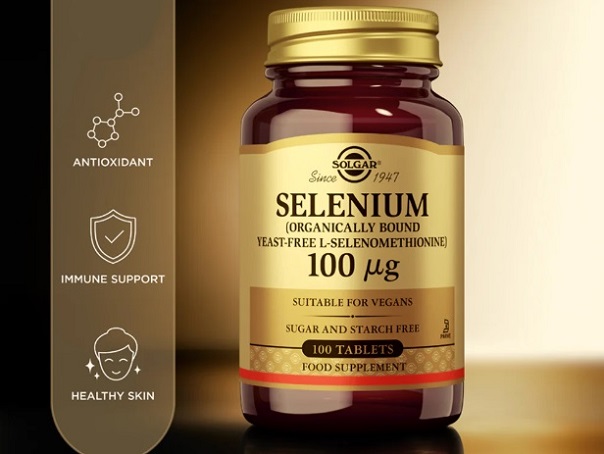Nikhil Prasad Fact checked by:Thailand Medical News Team Jan 20, 2025 2 months, 3 weeks, 3 days, 8 hours, 11 minutes ago
Medical News: Selenium (Se), an essential trace element, plays a pivotal role in maintaining various physiological functions in the human body. It contributes to the regulation of oxidative stress, inflammation, and cellular metabolism. This
Medical News report explores groundbreaking findings on the potential of selenium and its related compounds in combating multi-organ fibrosis, a serious condition marked by abnormal tissue scarring in vital organs such as the heart, lungs, liver, and kidneys.
 Using Selenium to Treat Multi-Organ Fibrosis
Using Selenium to Treat Multi-Organ Fibrosis
Research conducted by scientists from The Central Hospital of Enshi Tujia and Miao Autonomous Prefecture, Hubei Minzu University, and the Hubei Selenium and Human Health Institute in China, delves into selenium's biological mechanisms and its impact on fibrotic diseases. By reviewing the interactions between selenium compounds and fibrosis pathways, the researchers offer promising insights into innovative therapeutic approaches.
Understanding Organ Fibrosis and Its Global Impact
Organ fibrosis is a pathological condition characterized by the excessive accumulation of extracellular matrix components such as collagen. This process, triggered by chronic inflammation or injury, disrupts the structure and function of affected organs, ultimately leading to life-threatening complications. Fibrosis contributes significantly to global morbidity and mortality, with approximately 35% of deaths in the United States linked to fibrotic diseases.
The heart, lungs, liver, and kidneys are especially susceptible to fibrosis. For example, myocardial fibrosis can result from prolonged hypertension, while liver fibrosis is often linked to chronic viral infections or alcohol abuse. Pulmonary fibrosis, on the other hand, can arise from environmental exposures or infections like COVID-19, and kidney fibrosis is frequently a complication of chronic kidney disease. Researchers emphasize the urgent need for targeted interventions to address these conditions, particularly given their silent progression in early stages.
Selenium's Mechanisms Against Fibrosis
Selenium's biological activity largely depends on its incorporation into selenoproteins, which include glutathione peroxidases (GPX), thioredoxin reductases (TrxR), and selenoprotein P. These proteins help mitigate oxidative damage and modulate signaling pathways implicated in fibrosis. For instance, GPX1 has been shown to reduce reactive oxygen species (ROS) and inhibit pathways that promote fibrosis in lung and kidney tissues.
One of the critical pathways influenced by selenium is the transforming growth factor-beta (TGF-β) signaling pathway, widely regarded as a primary driver of fibrosis. Activated TGF-β stimulates fibroblast proliferation and extracellular matrix deposition. Selenium compounds have demonstrated the ability to suppress this pathway, thereby reducing the severity of fibrotic responses.
Detailed Findings on Selenium's Effects in Specific Organs
-Heart
rong>: Selenium supplementation has been linked to improved outcomes in myocardial fibrosis by enhancing antioxidant activity. Studies have shown that selenium-enriched nanoparticles can restore mitochondrial function, reduce cell death, and decrease fibrosis-related markers in heart tissues. Novel selenium-based materials, such as self-sustaining selenium nanoparticles, exhibit prolonged antioxidant effects, offering a sustained defense against oxidative stress in cardiac tissue.
-Liver: In cases of liver fibrosis, selenium has been found to modulate the activation of hepatic stellate cells, the primary drivers of extracellular matrix deposition. Experimental models have revealed that selenium supplementation can increase apoptosis in activated stellate cells and reduce inflammation. Selenium-enriched probiotics have also shown promise in reducing liver oxidative stress and fibrosis-related protein expression.
-Lungs: Pulmonary fibrosis, particularly as a complication of COVID-19, has been linked to selenium deficiency. Clinical studies indicate that selenium enhances immune responses and reduces inflammation in lung tissues. Selenium-containing nanoparticles have demonstrated the ability to prevent cellular senescence and ferroptosis, mechanisms that contribute to lung damage and fibrosis.
-Kidneys: In renal fibrosis, selenium deficiency exacerbates oxidative stress and promotes fibroblast activation. Selenium compounds have been shown to regulate metalloproteinases and their inhibitors, which are critical in maintaining extracellular matrix balance. Selenium nanoparticles have also demonstrated protective effects against kidney fibrosis by modulating signaling pathways such as GPx-1/NLRP3.
Emerging Therapeutics Based on Selenium
Researchers are developing innovative selenium-based therapies to combat fibrosis. These include selenium-enriched nanoparticles, polymers, and combined formulations with other antioxidants. For example, selenium-containing hydrogel polymers have been designed to reduce inflammation and fibrosis in heart tissues, while selenium-rich green tea has been identified as a dietary intervention to mitigate liver fibrosis.
Moreover, selenium-enriched dietary supplements and probiotics are gaining attention for their ability to enhance immune function and provide anti-fibrotic effects. These advances underscore selenium's potential as a cornerstone in the management and prevention of fibrotic diseases.
Conclusion
The findings of this extensive research highlight selenium's transformative potential in addressing multi-organ fibrosis. By modulating oxidative stress, inflammation, and signaling pathways, selenium and its compounds offer hope for innovative therapies targeting fibrotic diseases. The research underscores the importance of continued exploration into selenium's applications, aiming to improve patient outcomes and quality of life.
For patients affected by fibrosis, selenium could pave the way for more effective treatments and prevention strategies. As scientific understanding deepens, the development of selenium-based therapeutics may revolutionize the field of anti-fibrotic medicine, providing a beacon of hope for millions worldwide.
The study findings were published in the peer-reviewed journal: Drug Design, Development and Therapy.
https://www.tandfonline.com/doi/full/10.2147/DDDT.S488226
For the latest on Fibrosis, keep on logging to Thailand Medical News.
Read Also:
https://www.thailandmedical.news/news/selenium-s-potential-in-fighting-carcinogenesis
https://www.thailandmedical.news/news/selenium-helps-to-reduce-hiv-viral-loads-and-also-prevent-cd4-levels-from-declining
https://www.thailandmedical.news/news/covid-19-new-american-researchers-uncover-the-importance-of-selenium-and-glutathione-supplementation-in-covid-19-as-sars-cov-2-mpro-targets-these
https://www.thailandmedical.news/news/tryptamines-as-a-potential-weapon-against-fibrosis
https://www.thailandmedical.news/news/natural-compounds-show-promise-for-treating-intestinal-fibrosis
